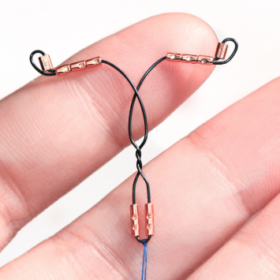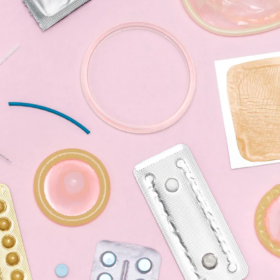
Mirena vs Copper coil: What’s the difference and which one is best?
What's the lowdown?
The copper coil (IUD) is a hormone-free contraceptive made of plastic and copper that can protect against unwanted pregnancy for up to 10 years
The Mirena coil is a brand of Intrauterine system (IUS) made from plastic that releases the hormone levonorgestrel and lasts up to 8 years
Some people report lighter periods with the Mirena, whilst some experience heavier periods with the copper coil
The Lowdown’s user-reported side effects show that some people have experienced more vaginal discharge with both types of coil
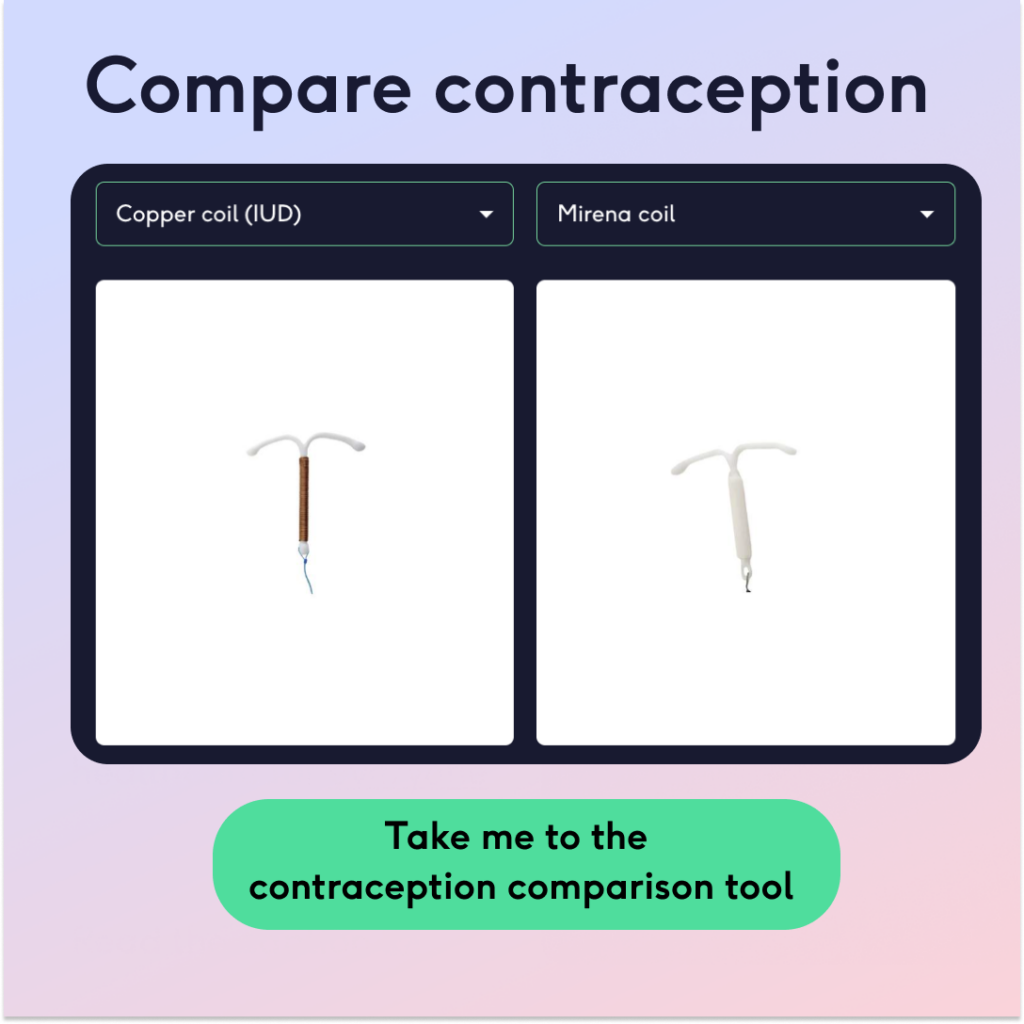
Once you have decided what birth control method you would like to try (check out our contraception recommender tool to help you figure it out), choosing the brand and type of that particular contraceptive is a decision in itself. Luckily, our team of women’s health experts are on hand to help you decide if you’re really stuck. If you‘d like to chat to one of The Lowdown’s doctors about choosing the right type of coil for you right now, you can book an appointment here.
To help you make the best choice for you, and hopefully without having to conduct so much trial and error, here’s the lowdown on the ins and the outs (pun intended) of coil contraceptives.
The Mirena coil, is a brand of IUS which stands for intrauterine system. There are several types of IUS but for now, we shall focus on the Mirena. It is made of a white T-shaped frame made from a plastic called polyethylene, and can last for up to 8 years for contraception.
The Mirena coil releases levonorgestrel, a synthetic form of the hormone progesterone, similar to the natural form produced by your ovaries. It thickens the cervical mucus, which makes it more difficult for sperm to move through the opening in the cervix, and thins the lining of the womb so a fertilised egg is less likely to be able to implant itself. For some women (around a quarter) it may also stop ovulation.
It is inserted into your womb by a doctor a nurse at an appointment which you can book at your local sexual health clinic or some GP practices.
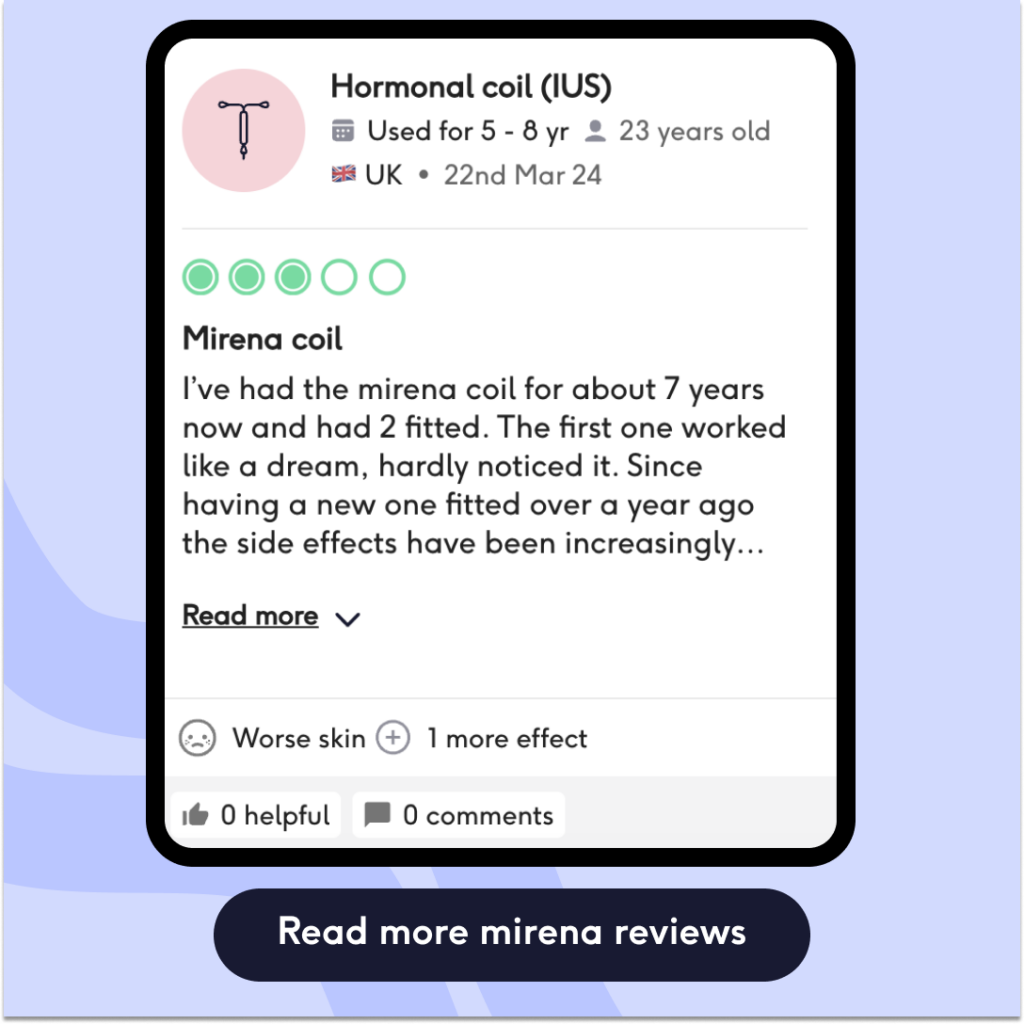
Copper coil or IUD (non-hormonal)
The IUD is a small plastic and copper device that, like the Mirena coil, is T-shaped and is inserted into your womb.
The copper alters the cervical mucus, which makes it more difficult for sperm to reach an egg and survive. It can also stop a fertilised egg from being able to implant itself into the lining of the womb.
The copper coil can last from 5 years to up to 10 years depending on which make of coil you have.
Unlike the Mirena coil, the Copper IUD is hormone free.
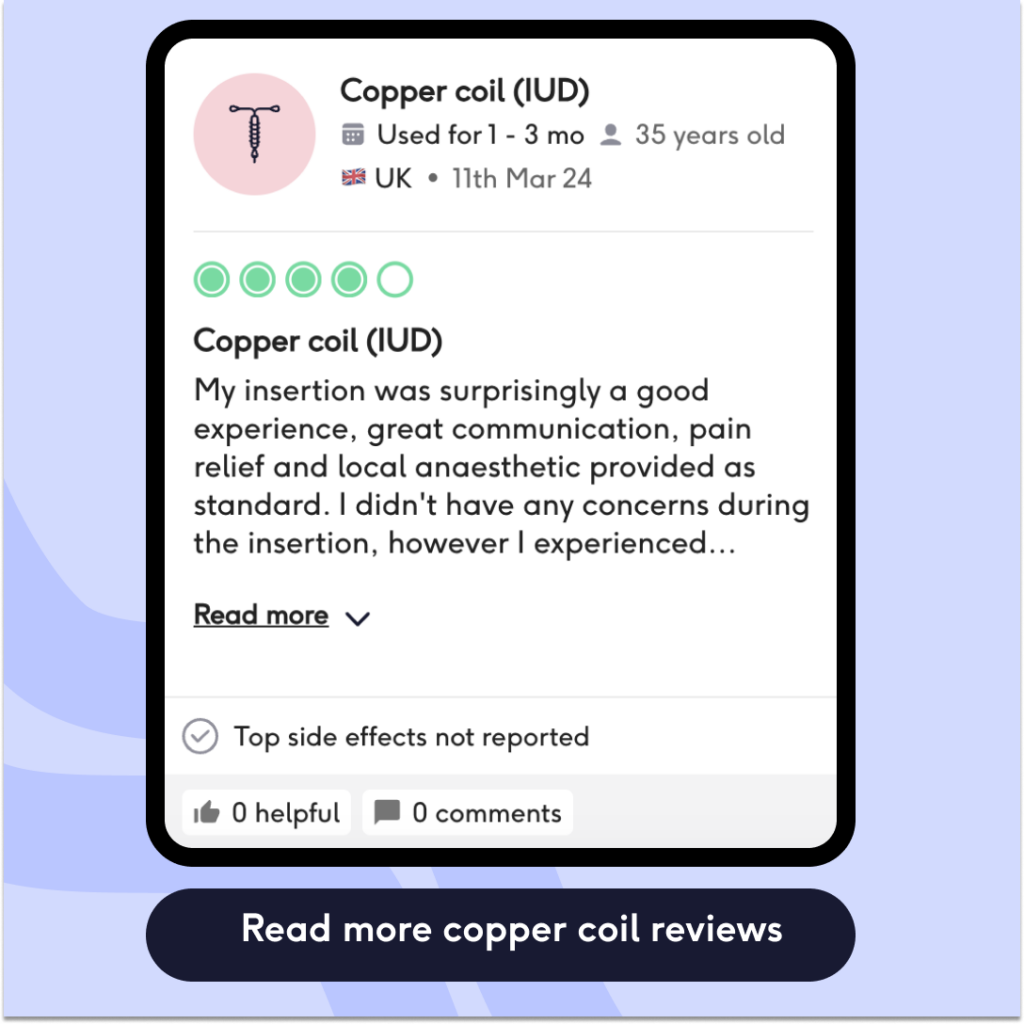
Side by side coil comparisons
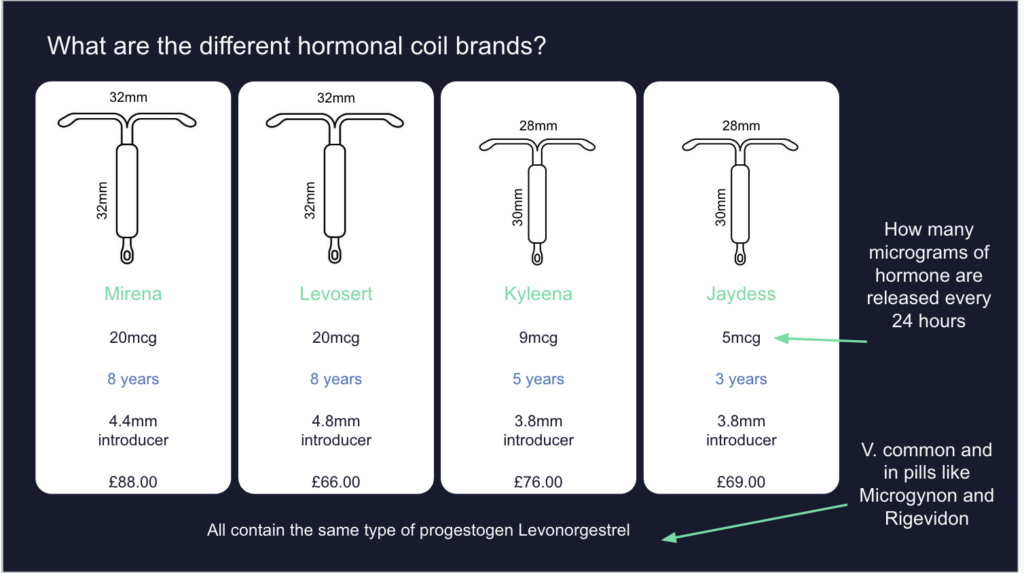
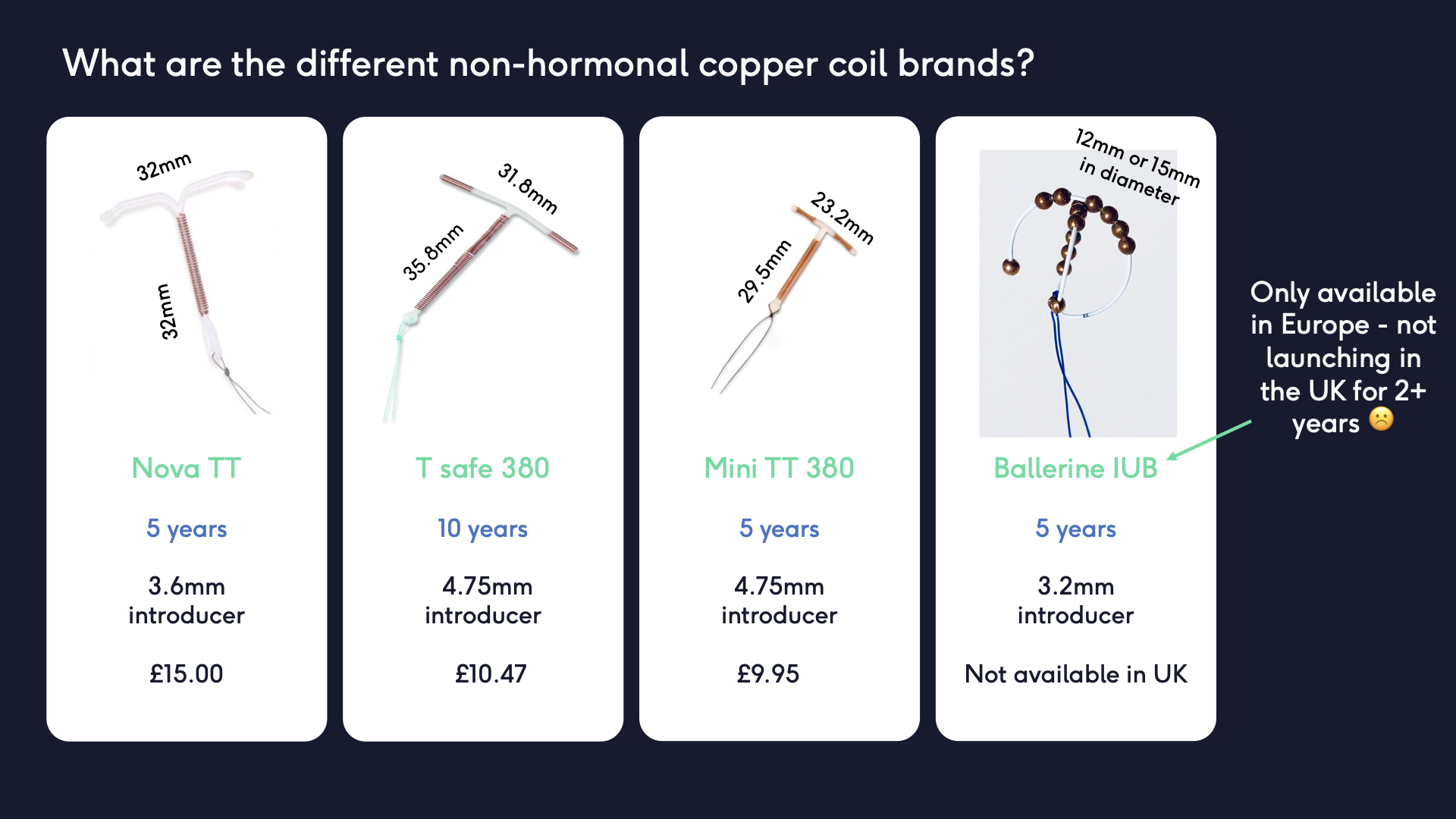 Prices refer to how much each coil costs the NHS (as of September 2022)
Prices refer to how much each coil costs the NHS (as of September 2022)
Advantages of both coils
- The copper IUD protects you from pregnancy right away. If the Mirena coil is inserted in the first 7 days of your menstrual cycle you are protected from pregnancy straight away. If it’s fitted at any other time, you need to use additional contraception, such as condoms, for 7 days after
- Once in, it can be left until you wish for it to be removed or it is due to be replaced
- Both can be used while breastfeeding
- Both are not affected by other medicines
- The Mirena coil is useful if you can’t use the hormone oestrogen, which is in the combined pill, the contraceptive patch and the contraceptive vaginal ring. Similarly the copper IUD does not contain hormones and can also be an option if you cannot take oestrogen or experience side effects with hormonal contraception
- Both the IUS and IUD are two of the most effective forms of contraception available
- It’s possible to get pregnant as soon as the IUS or IUD is removed

Side effects of both coils
Despite them protecting you from pregnancy, neither coil prevents you from getting sexually transmitted diseases (STIs).
They could affect your menstrual cycle. For the Mirena coil, many women experience spotting, lighter periods or their periods stop altogether. However for the copper coil, women can experience heavier, longer and more painful periods, though this may improve after 6 months.
With the Mirena coil, some women experience side effects such as acne, headaches or breast tenderness, usually in the first few months. Some women also experience changes in mood or libido. There are no hormonal side effects, such as acne or breast tenderness with the copper IUD.
Although very rare, some women using the IUS can develop small fluid-filled cysts on their ovaries. These usually disappear without treatment.
What do our reviews say?
One of the great things about The Lowdown is that real contraception users tell us their thoughts on the contraception they have tried, which we hope helps you make a better decision when you are considering going on or coming off one.
For the Mirena coil, almost half (45%) of reviewers said it stopped their periods completely but for the copper coil, the majority (64%) said their periods became heavier.
Over half (58%) of reviewers said the Mirena coil either improved or did not affect their moods and 75% said the same for the copper coil.
Just below half (44%) said the Mirena coil caused no change to their sex drive, 10% said it increased and 29% said they felt a loss in their sex drive. For the copper coil, 64% of females said there was no change in their sex drive, 16% said there was an increase and 12% said there was a drop.One of the most common side effects immediately after having the Mirena coil put in was vaginal discharge. Of the 41% reviewers who said they had vaginal discharge, almost 10% said it affected them a lot or a great deal.
Likewise, the same side effect was reported as the most common for the copper coil right after insertion. Of the 43% who said it was a side effect, 8% said they had a great deal of vaginal discharge, 11% quite a bit and 18% a bit. (taken from data as of May 21 2024)
Mirena vs Copper coil experiences
Mirena coil
“I have used the coil for best part of 20 years after my now 20 year old son was born. I would highly recommend, after trying the pill before this, hated that!”
“The day I had it fitted I had THE WORST cramps I have ever had but I did also have some post smear investigations done at the same time so they probably didn’t help. I had irregular bleeding for about 6 weeks due to having my implant removed and coming off the pill at the same time as having this fitted (hormones all over the place!) 3 months ish in and it’s the best thing I ever did! No side effects, no bleeding, no remembering to take anything and covered for 8 years. Bonus I feel so much happier/positive, loss a bit of weigh (I do exercise a lot) and increased sex drive.”
“I waited 2 years before getting the Mirena coil as I had heard so many horror stories. I saved up so I could go privately to a highly experienced gynaecologist as I was petrified about the insertion. I have had 2 babies, but I honestly did not even know she had inserted it! She gave me a numbing injection which didn’t hurt either, maybe that helped. No cramps until the evening which were quite strong, but a hot water bottle and ibuprofen helped. Some greasiness and spots in the first 3 months. However, 6 months later, no periods, no cramps, skin is back to normal, no bloating and a very reliable form of contraception. Best contraception I have used and just wish I had gone for it sooner! Advice would be, get a very experienced professional to insert, and keep with it for 6 months for your body to fully adjust.”
Copper coil
‘Painful insertion’
“The insertion was very painful however I think worth it if it works for you in the long term. The positives were no change in hormones so no change in weight, mood and other changes from hormonal contraception. For me it just made my periods too uncomfortable and I also got thrush and cystitis. I’ve heard since that it is better for women who have had children so maybe that was why.”
‘Very happy’
“Insertion was painful and I did feel faint during the procedure but it was quick and i felt better after about 10 mins. Since then my periods have been heavier but no change in PMS, pain or cramps and more importantly to me no change to mood, skin, weight or libido like hormonal contraception can do. Very happy with the copper coil, I can tolerate slightly heavier periods and don’t have to worry about pregnancy or the hormonal side effects of other methods.”
‘Terrible cramping’
“The Paragard was great in some ways but it caused me terrible cramping, heavy periods (I mean like soak a super sized tampon in an hour, which normally for me wouldn’t happen even in a day), and worst of all chronic, recurrent yeast and bv infections. I have had it out for more than a year and seem to have permanently altered my vaginal Microbiome as I am still getting the occasional infection. Worst decision of my life. If you’re cool with risking long term dysbiosis, go for it, as it is a well documented side effect. Otherwise, stay away.”Still not sure which is best for you? Compare the Copper IUD vs Mirena in our brand new Contraception Comparison tool for side by side pros and cons. Or book an appointment for advice from our friendly doctors.
Our medical review process
This article has been medically reviewed for factual and up to date information by a Lowdown doctor.



